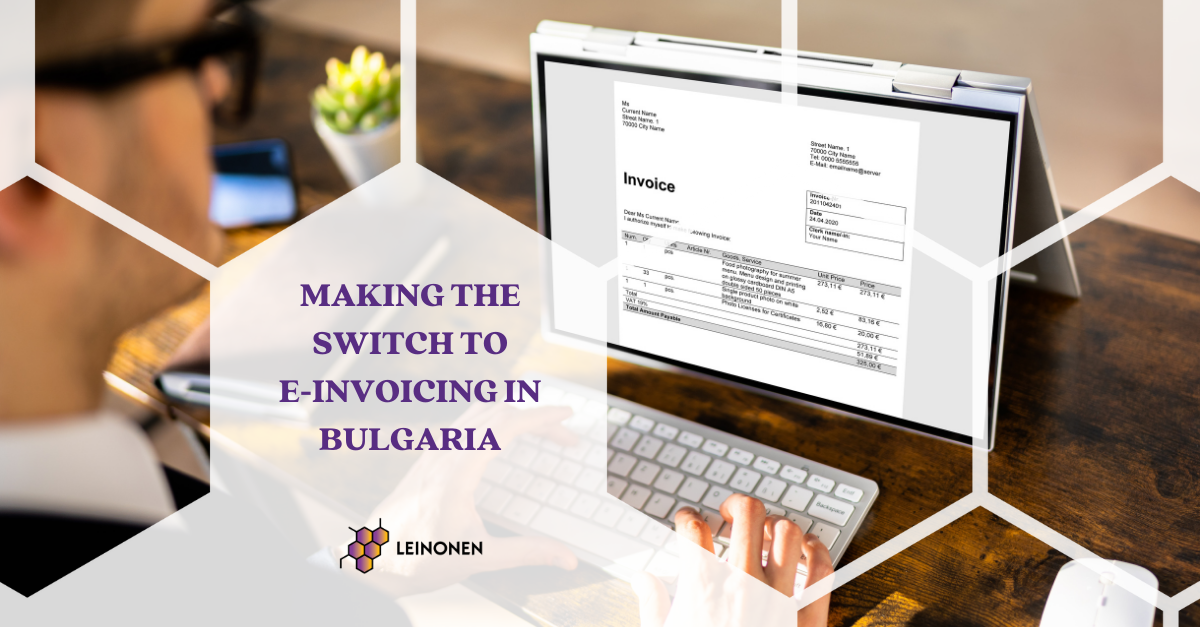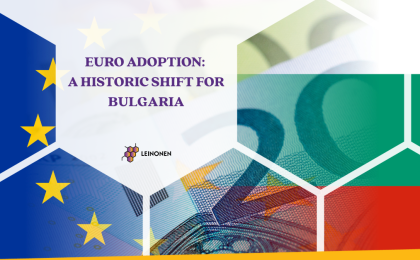Modern accounting systems and processes are becoming more streamlined and automated than ever before. In 2024, e-invoicing is increasingly being adopted by European businesses and is likely to become the ‘norm’ in years to come. While still in its infancy, e-invoicing is leading the way to more efficient and error-free accounting in Bulgaria.
What is E-invoicing?
Electronic invoicing (e-invoicing) is a contemporary approach to accounting that allows businesses to digitally send and receive invoices in a way that does not require traditional paperwork. In most cases, e-invoices are sent directly from one party’s e-invoicing application to another’s, requiring little to no manual input. The e-invoice is delivered in a digitalised format that can be automatically read and processed by the recipient’s system. E-invoices are sometimes referred to as EDI invoices or e-bills.
E-invoicing in Bulgaria
While e-invoices are recognised as official documents by both Bulgarian and European legislation, a common structured e-invoicing system is not yet available in Bulgaria. This means that e-invoices are typically sent via email, rather than directly from one accounting system to another. Though this does remove an element of automation from the process, there are still an array of benefits of e-invoicing in Bulgaria.
Benefits of E-invoicing for Businesses and Accountants
A 2019 Global Report by Webexpenses and The Association of Certified Accounts Payable Professionals (ACAPP) found that for two thirds of businesses, invoice processing alone took upwards of five days each month. E-invoicing is a valuable time-saving solution, offering streamlined convenience far beyond its paper counterpart.
E-invoicing can greatly reduce the risk of human error, leading to a more secure experience for businesses and accountants. For example, errors in sequencing and duplication of numbering, as well as incorrect cancellation or archiving of documents can be minimised, potentially saving a great deal of time and stress. Some modern e-invoicing applications also use integrated AI to provide suggestions for (or automated) bookkeeping, making the whole process much more effortless and organised for accountants and clients alike.
When e-invoices are sent digitally, the potential of them getting lost in transit or sent to the wrong address is also drastically reduced. And by eliminating the need for paper and postage, it is a more environmentally friendly method of accounting. In practice, e-invoicing can also save valuable desk and filing space for businesses.
In Summary, the key Benefits of E-invoicing are:
- Saving time and energy.
- Reducing the risk of human error.
- Improving security.
- Reducing the chance of invoices getting lost.
- Being more environmentally friendly.
- Saving physical archive space.
- Allowing for effortlessly organised bookkeeping.
Security Measures for E-Invoicing in Bulgaria
As with any system for businesses, there are vital security measures and regulations to consider when introducing e-invoicing. For example, e-invoices must meet the legal requirements of article 7 of the Civil Code (C), and articles 114 and 115 of the Law on Value Added Tax (VAT).
It is also important to note that an e-invoice being sent digitally does not automatically make it an electronic document that must be signed with an electronic signature. When an e-invoice is issued, it is accepted as a technical carrier of information (like a PDF file), which can then be printed to a hard copy.
Therefore, according to Bulgarian legislation, no seal or signature is required when issuing an e-invoice (just like a paper invoice). However, the Accounting Law states that while not mandatory, an invoice can be issued as an electronic document. If a business chooses to do so, it must be issued in accordance with the Electronic Document and Electronic Signature Law.
While there are no industry specific considerations for e-invoicing in Bulgaria, it is important to stay informed on Bulgarian requirements for invoicing (e.g. including invoice number, date of invoice, client name and address, payment due date etc.) An accountant can offer up to date guidance on current best practices in this respect.
Moving From Paper to E-invoicing in Bulgaria
Transitioning from paper to e-invoicing is fairly simple and will save you countless admin hours in the long run. You will need to choose an invoicing application that works for you. In Bulgaria, some of the most popular invoicing applications are inv.bg, e-faktura and invoicepro.bg.
Because a common structured system has not been implemented in Bulgaria, e-invoices cannot yet be automatically processed using these systems. This is where an accountant can help. An experienced accountant can work with different invoice pre-booking applications and accounting software, developing export and import files that allow invoices to be processed swiftly and semi-automatically.
How Leinonen Accounting in Bulgaria can Help
Due to the lack of a common system, e-invoicing in Bulgaria can be a little more complicated to set up for maximum efficiency. Therefore, it is important to have an accountant by your side that is familiar with navigating Bulgarian regulations. If your company deals with a lot of documents, moving to e-invoicing could make your life a lot easier.
Using an OCR-recognised application with AI integration for automatic invoice pre-booking, Leinonen can completely eradicate the need for paper invoicing. Using this system, our experienced accountants have already helped numerous clients discover simpler and more accurate invoicing processes.
Accounting in Bulgaria is fast changing, and as e-invoicing steadily becomes the norm, we will help you reap every benefit at the earliest possible opportunity.
To find out how Leinonen can transform your business’ invoicing process with e-invoicing, get in touch and arrange a consultation today.





